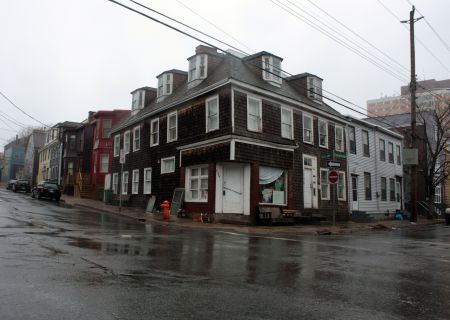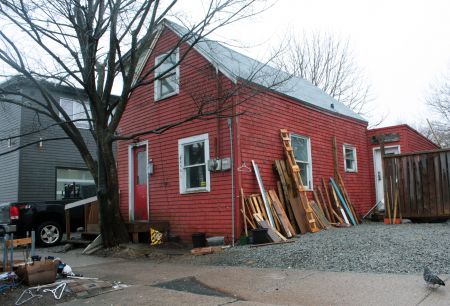After searching for more than a year, the Roberts Street Social Centre has found a new home on Creighton Street.
The artist collective’s new space is only temporary, however. The street-level storefront that straddles Falkland and Creighton Streets doesn’t come with a lease.
The landlord, Margaret Matthews, has sold the property and is allowing the social centre to stay until February, 2014, when developer Adam Barrett will take ownership.
“They have been explicit that they want to evict the tenants and gut the building,” collective member Emily Davidson said of the new owner.
A similar situation led the centre to leave its old location, a little red house on Roberts Street.
The centre began as a living room project of two tenants at 5684 Roberts Street. In 2005, it grew into a collective of artists who used the tiny house as a studio and offered access to the surrounding community at affordable rates. The building hosted a zine library, a screen-printing studio, “The Peoples Photocopier” and a summer residency program in the backyard shed.
In January 2012, however, landlord Ken-Porter, who hyphenates his name, gave the collective notice to quit.
Porter, who owns computer store K-PC Conseilleurs Ltée nearby on Agricola Street, bought the house on Roberts Street in 1997 and planned to eventually move in. He was happy to rent the building to the artists in the meantime; he is keenly interested in art and thought they “added great value to the community.”
In the last couple of years, however, Porter said he ran into financial trouble.
For a little while it seemed he might be able to “let them off the hook,” and the tenants entered into a month-to-month lease. But by the end of 2012, Porter said his financial state became untenable, and his only reasonable option was to sell his building on Agricola Street and move into the red house on Roberts Street.
“I simply have too much debt on [the Agricola Street property], and I can’t afford the debt,” Porter said.
Rising property values in the north end factored into Porter’s decision. He paid $50,000 for his Agricola Street property and is asking $300,000.
He may get close to that. In 1998, according to a Royal LePage Survey of Canadian House Prices, a detached bungalow in the north end cost $86,000. In 2013, it costs $275,000.
Between 1997 and 2012, according to the CMHC Rental Market Report, average rental rates in the north end increased from $563 to $962.
For the entire Roberts Street house, Porter charged the artists $655 plus utilities. Davidson confirmed this, and said their monthly rent totalled about $1,000. (It was difficult to heat the place, Davidson said.)
When the artists began searching for a new space last year, it became clear that physically-accessible spaces for under $1,000 per month were rare in the north end.
The space on Creighton Street costs under $1,000, Davidson said, but wouldn’t be more specific. The volunteer-run centre subsists purely on project grants and donations amounting to $20,000 a year, Davidson said. “Our budget is miniature.”
Recently, collective members themselves have struggled to find affordable housing in the north end, she said.
“In a very practical way, rising rents mean it’s very hard to find space that is an appropriate price for the programming we want to do. In a very direct way, we feel that we’ve been priced out of this neighbourhood,” Davidson said.
However, she continued, “we have for the entire time we’ve been occupying Roberts Street, noted how we are also players in gentrification.”
“When we were founded in 2005, gentrification was already happening in the neighbourhood,” she said. “We are both displacing and being displaced.”
It’s a similar story elsewhere in North America. In Toronto’s Queen West area, trendy businesses are setting up shop as renters with increasingly deeper pockets move into the area. In Vancouver’s lower east side, anti-gentrification protesters torched a new development and smashed the windows of a pizza shop. And in Brooklyn, New York, artists have attracted development, pushing out former lower-income residents, and eventually, the artists themselves.
In Halifax, developers, realtors and landlords point to artists, galleries and creative types in the north end as positive attributes of living in a chic arts district. The centre’s presence in the neighbourhood allows that narrative to continue, Davidson said.
It’s important to view the change in the north end as a process of displacement rather than beautification, she said.
In the future, if the Roberts Street Social Centre (which will keep its former name for now) can’t find a space for less than $1,000, the collective may have to reconsider program funding.
“Will the collective decide in the future that we need to go after more consistent government funding? We’ve leaned away from that because there are strings attached with that kind of money, and we’ve wanted to be able to do our own thing,” Davidson said.
A small but growing number of north end retailers and galleries are beginning to share space as rent rises. Roberts Street may use a similar strategy in the future.
“There are quite a few like-minded organizations that are in need of spaces,” Davidson said. “Our hope is that we will be able to continue to offer accessible programming as an autonomous organization.”





